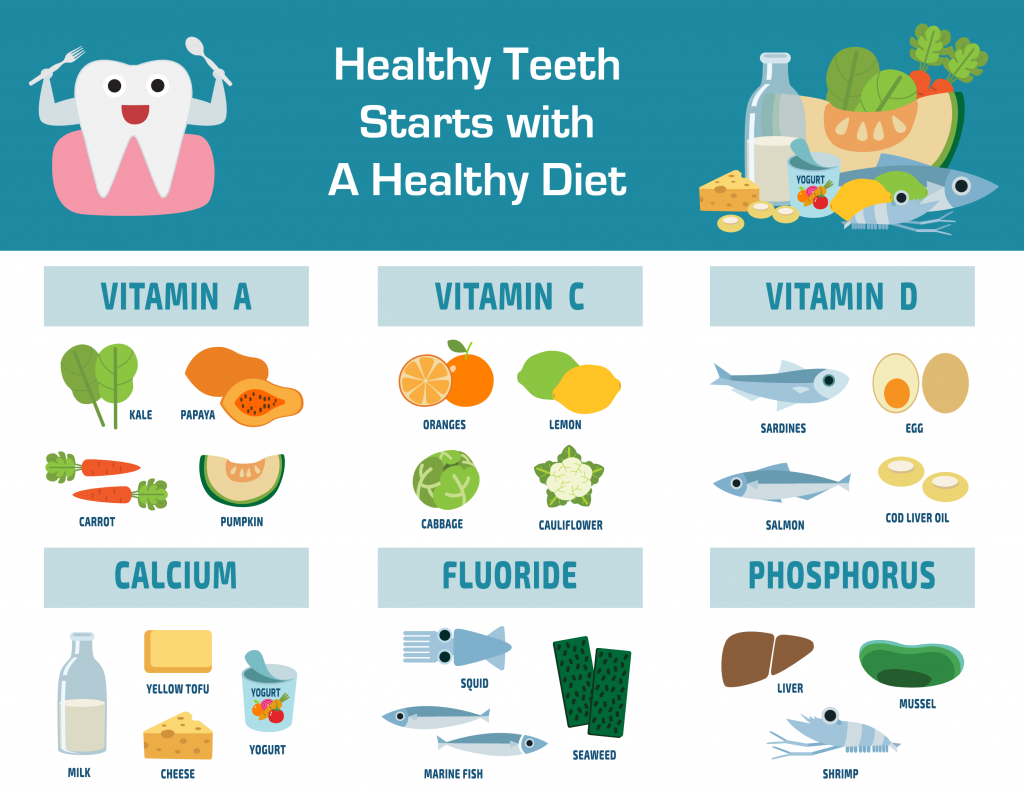Nutrition for Dental Health

The Importance of Nutrition for Dental Health
Good nutrition is essential for maintaining healthy teeth and gums. A balanced diet that contains all the necessary nutrients is crucial for preventing tooth decay and gum disease. Poor nutrition can weaken the immune system, making it difficult for the body to fight off infections that can lead to dental problems.
How Nutrition Affects Oral Health
Nutrition affects oral health in several ways. The following are some of the ways nutrition can impact oral health:
1. Tooth decay
A diet that is high in sugar and carbohydrates can increase the risk of tooth decay. The bacteria in the mouth feed on sugar, which produces acid that can erode tooth enamel and lead to cavities.
2. Gum disease
A diet that is low in vitamin C can lead to gum disease. Vitamin C is essential for healthy gums, and a deficiency can cause bleeding gums and other gum problems.
3. Bad breath
A diet that is high in sugar and carbohydrates can cause bad breath. The bacteria in the mouth feed on sugar, which produces a foul odor.
Foods that Promote Dental Health
The following are some of the foods that can help promote dental health:
1. Crunchy Fruits and Vegetables
Crunchy fruits and vegetables, such as apples, carrots, and celery, can help clean the teeth and stimulate the production of saliva, which helps neutralize acid in the mouth.
2. Dairy Products
Dairy products, such as milk and cheese, are rich in calcium, which is essential for strong teeth and bones. They also contain casein, a protein that helps strengthen tooth enamel.
3. Leafy Greens
Leafy greens, such as spinach and kale, are rich in vitamins and minerals, including calcium and vitamin C, which are essential for healthy teeth and gums.
4. Nuts and Seeds
Nuts and seeds, such as almonds and sunflower seeds, are rich in calcium and vitamin D, which are essential for strong teeth and bones. They also contain healthy fats that can help reduce inflammation in the mouth.
5. Water
Water is essential for good oral health. It helps wash away food particles and bacteria that can lead to tooth decay and gum disease.
Steps to Maintain Good Dental Health
The following are some steps you can take to maintain good dental health:
- Brush your teeth twice a day with fluoride toothpaste.
- Floss daily to remove food particles and plaque from between the teeth.
- Eat a balanced diet that is rich in vitamins and minerals.
- Avoid sugary and acidic foods and drinks.
- Visit your dentist regularly for checkups and cleanings.
Advantages and Disadvantages of Different Foods for Dental Health
| Food | Advantages | Disadvantages |
|---|---|---|
| Crunchy Fruits and Vegetables | Help clean the teeth and stimulate saliva production | May cause sensitivity in some people |
| Dairy Products | Rich in calcium and casein, which help strengthen tooth enamel | High in fat and calories |
| Leafy Greens | Rich in vitamins and minerals, including calcium and vitamin C | May cause staining in some people |
| Nuts and Seeds | Rich in calcium and vitamin D, and contain healthy fats that can reduce inflammation in the mouth | High in calories and fat |
| Water | Essential for good oral health and helps wash away food particles and bacteria | None |
Conclusion
Good nutrition is essential for maintaining healthy teeth and gums. A balanced diet that is rich in vitamins and minerals is crucial for preventing tooth decay and gum disease. By eating a variety of nutritious foods and following good oral hygiene practices, you can maintain good dental health and prevent dental problems.
FAQ
Q. How does sugar affect dental health?
A. Sugar can increase the risk of tooth decay by feeding the bacteria in the mouth, which produces acid that can erode tooth enamel and lead to cavities.
Q. What are some foods that can cause bad breath?
A. Foods that are high in sugar and carbohydrates can cause bad breath by feeding the bacteria in the mouth, which produces a foul odor.
Q. How does vitamin C affect dental health?
A. Vitamin C is essential for healthy gums, and a deficiency can cause bleeding gums and other gum problems.
Q. How often should I visit the dentist?
A. You should visit the dentist regularly for checkups and cleanings. The frequency of your visits will depend on your individual needs and the recommendations of your dentist.
